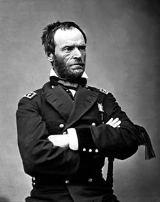
during the American Civil War
(1861–65), for which he received recognition for his outstanding command of military strategy
as well as criticism for the harshness of the "scorched earth
" policies that he implemented in conducting total war
against the Confederate States
. Military historian B.
I regard the death and mangling of a couple thousand men as a small affair, a kind of morning dash — and it may be well that we become so hardened.![]()
Atlanta is ours, and fairly won.![]()
Hold the fort! I am coming!![]()
I confess, without shame, that I am sick and tired of fighting — its glory is all moonshine; even success the most brilliant is over dead and mangled bodies, with the anguish and lamentations of distant families, appealing to me for sons, husbands, and fathers ... it is only those who have never heard a shot, never heard the shriek and groans of the wounded and lacerated ... that cry aloud for more blood, more vengeance, more desolation.![]()
I can make this march, and I will make Georgia howl!![]()
I hereby state, and mean all I say, that I never have been and never will be a candidate for President; that if nominated by either party I should peremptorily decline; and even if unanimously elected I should decline to serve.![]()

